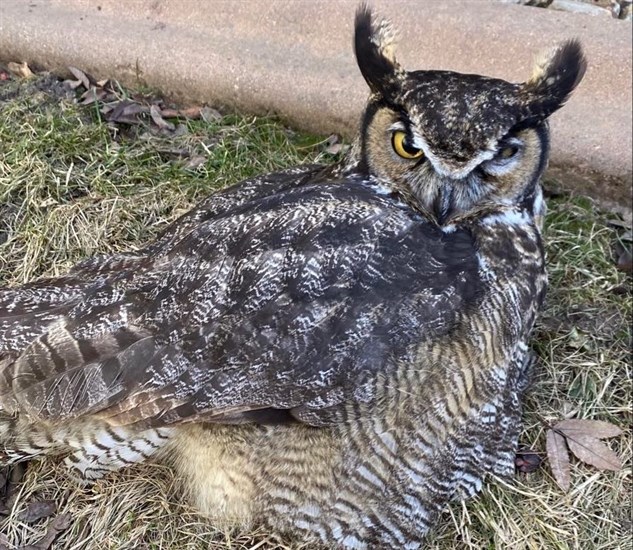
Henry the great horned owl.
Image Credit: SUBMITTED: Kathy Renaud
April 06, 2021 - 7:30 AM
It was a close brush with death, but following four weeks of intensive rehab, 'Henry' a great horned owl, has taken to the skies once again.
On March 28, Henry was released back into the wild at the very same place where one-month earlier Coldstream resident Kathy Renaud found the owl facedown.
Renaud said her dogs found the owl on her five-acre Coldstream property and she realized the bird wasn't in a good way.
It was lying facedown and barely breathing, Renaud said.
Multiple phone calls later and Henry found his way to the South Okanagan Rehabilitation Centre for Owls in Oliver.
"The owl had secondary poisoning, which means he ate a rodent that had been poisoned," Renaud said.
READ MORE: If poison isn't the answer, how should the Interior get rid of its rat infestation?
South Okanagan Rehabilitation Centre for Owls manager Dale Belvedere said it was lucky Renaud found Henry and quickly got him to the centre.
"You have to get to the bird straight away, in three days they are dead," she said.
Once at the raptor centre, it was determined that Henry had lost his sight and could no longer use his talons.
Belvedere said both these symptoms are signs of poisoning.
"We were just lucky we got to him when we did," Belvedere said.
Henry stayed at the rehab centre for one month being taken back to Renaud's property to be released. As owl's mate for life it's hoped Henry will easily find his old mate again.
And he had no hesitation in heading back to the sky once his cage was opened.
"He just flew, he just kept going," Renaud said.
While Henry managed to survive being poisoned, most don't survive.
Belvedere said the centre normally deals with at least 10 cases of poisoning each year, and recently she's seen an uptick in cases, although can't speculate as to why.
The issue of secondary poisoning has been highlighted recently with the City of Salmon Arm adding its name to the list of municipalities across the province that have banned rodenticides.
The B.C. SPCA has also called for a province-wide ban of rodenticides.
To contact a reporter for this story, email Ben Bulmer or call (250) 718-0428 or email the editor. You can also submit photos, videos or news tips to the newsroom and be entered to win a monthly prize draw.
We welcome your comments and opinions on our stories but play nice. We won't censor or delete comments unless they contain off-topic statements or links, unnecessary vulgarity, false facts, spam or obviously fake profiles. If you have any concerns about what you see in comments, email the editor in the link above.
News from © iNFOnews, 2021